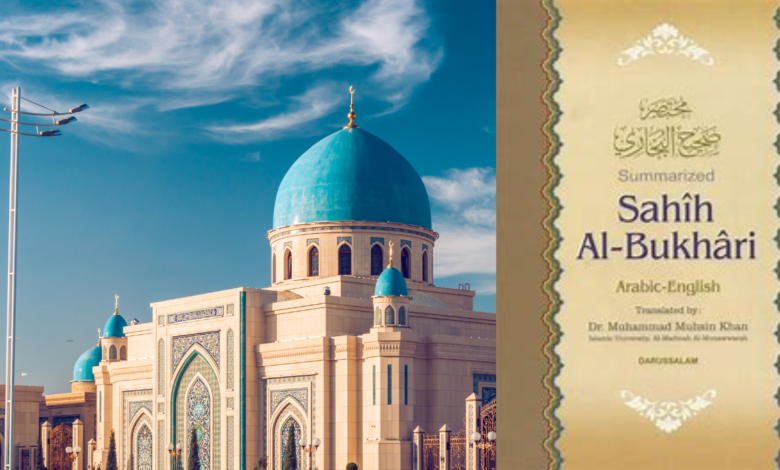
Sahih al‑Bukhari
Sahih al-Bukhari is one of the most renowned and authentic collections of Hadith (sayings and actions of the Prophet Muhammad) in Sunni Islam. It is considered the most authentic Hadith collection after the Quran.

Introduction
Sahih al-Bukhari, often referred to as the most authentic collection of hadith in Sunni Islam, holds a position of immense importance in the lives of Muslims around the world. Compiled by Imam Muhammad ibn Ismail al-Bukhari, this collection of hadith (sayings, actions, and approvals of Prophet Muhammad) has played a pivotal role in shaping Islamic jurisprudence, theology, and the way of life for over a millennium. In this article, we delve into the significance, compilation process, and enduring legacy of Sahih al-Bukhari.
The Importance of Hadith
In Islam, the Quran is the ultimate source of guidance and authority. However, the hadith provides a crucial supplementary source of knowledge about the life and teachings of the Prophet Muhammad. The hadith serve as practical examples of how to implement the Quranic teachings in daily life, elucidating its sometimes abstract or general verses.
The Compilation of Sahih al-Bukhari
Imam al-Bukhari, born in 810 CE in Bukhara (in present-day Uzbekistan), began his monumental task of collecting authentic hadith at a young age. He traveled extensively throughout the Islamic world, seeking and verifying the authenticity of the reported narrations. Imam al-Bukhari was meticulous in his selection process, applying strict criteria to ensure the accuracy and authenticity of the hadith he included in his compilation.
Also Check
- What is the Resurrection in Islam?
- Who is Allah?
- Who were the grandsons of Prophet Muhammad?
- Where are the 25 Prophets of Islam in order?
- The Importance And Benefits Of Surah Baqarah
The criteria for authenticity included:
- The Chain of Narrators (Isnad): Every hadith had to have a complete and unbroken chain of narrators stretching back to the Prophet Muhammad. Imam al-Bukhari only accepted narrators who were known for their integrity and reliability.
- The Reliability of Narrators (Adalat): Each person in the chain of narrators had to be morally upright and trustworthy.
- Consistency in Narrations (Mutaba’at): The content of the hadith had to be in agreement with other authentic narrations and not contradict established Islamic principles.
- Freedom from Hidden Defects (‘Illah): Imam al-Bukhari was meticulous in identifying any hidden flaws or inconsistencies in the narrations, ensuring that they met his high standards of authenticity.
Out of hundreds of thousands of narrations he encountered during his travels and research, Imam al-Bukhari selected approximately 7,275 hadith for inclusion in his compilation. This rigorous selection process led to the name “Sahih” (authentic) al-Bukhari, signifying the unparalleled authenticity of the collection.
Legacy and Influence
Sahih al-Bukhari has had a profound impact on Islamic scholarship and practice. Its influence extends to various aspects of the Islamic tradition:
- Islamic Jurisprudence (Fiqh): Sahih al-Bukhari serves as a foundational source for Islamic legal scholars when deriving legal rulings and principles from the hadith. Many jurists consider it second in importance only to the Quran.
- Theology and Belief (Aqidah): The hadith in Sahih al-Bukhari have been instrumental in the development of Islamic creed, helping scholars formulate and articulate theological beliefs.
- Moral and Ethical Guidance: The collection contains numerous hadith addressing personal conduct, ethics, and character, offering Muslims guidance on how to lead virtuous lives.
- Spiritual Guidance: Many of the hadith in Sahih al-Bukhari pertain to acts of worship, supplication, and spiritual practices, helping individuals enhance their spiritual connection with Allah.
- Community Life: Sahih al-Bukhari also provides insights into community life, including social interactions, governance, and the conduct of leaders.
Conclusion
Sahih al-Bukhari stands as a testament to the unwavering dedication of Imam al-Bukhari in preserving the authentic teachings of the Prophet Muhammad. Its meticulous methodology and rigorous standards of authenticity have earned it the reputation of being the most trusted and respected compilation of hadith in Sunni Islam. For Muslims, Sahih al-Bukhari remains an invaluable resource, guiding their religious and ethical practices while preserving the teachings of Islam for generations to come.

FAQs about Sahih al-Bukhari
What is Sahih al-Bukhari?
Sahih al-Bukhari is one of the most renowned and authentic collections of Hadith (sayings and actions of the Prophet Muhammad) in Sunni Islam. It is considered the most authentic Hadith collection after the Quran.
Who compiled Sahih al-Bukhari?
Sahih al-Bukhari was compiled by Imam Muhammad ibn Ismail al-Bukhari (810-870 CE), a highly respected Islamic scholar. He dedicated his life to traveling, collecting, verifying, and documenting authentic Hadith.
How many Hadith are included in Sahih al-Bukhari?
Sahih al-Bukhari contains approximately 7,275 Hadiths, categorized into various chapters, which cover a wide range of topics, including faith, prayer, ethics, and jurisprudence.
What makes Sahih al-Bukhari authentic?
Sahih al-Bukhari is known for its rigorous criteria for authenticity. Imam al-Bukhari employed strict scrutiny and verification methods, including the requirement of multiple reliable chain narrators (Isnad) and the absence of contradictions (Mutaba’at).
Is Sahih al-Bukhari considered the most authentic Hadith collection?
Yes, Sahih al-Bukhari is widely regarded as the most authentic Hadith collection in Sunni Islam. It is often referred to as the “Sahih” (authentic) Hadith collection.
How is Sahih al-Bukhari organized?
Sahih al-Bukhari is organized into books (Kitabs), each of which covers specific themes or topics. Within these books, Hadiths are further divided into chapters (Bab) and sub-chapters (Kitab). This organization helps readers easily access relevant Hadith.
Can non-Muslims read Sahih al-Bukhari?
Yes, non-Muslims are allowed to read Sahih al-Bukhari. It is a valuable resource for anyone interested in understanding the traditions and teachings of Islam. However, it is essential to approach it with an open mind and a respectful attitude.
What is the significance of Sahih al-Bukhari in Islamic jurisprudence?
Sahih al-Bukhari plays a crucial role in Islamic jurisprudence (Fiqh) as it provides authentic Hadiths that scholars use to derive legal rulings and ethical guidance. It is a primary source of religious and legal authority in Sunni Islam.
Are all Hadiths in Sahih al-Bukhari considered equally important?
While all Hadiths in Sahih al-Bukhari are considered authentic, some are more significant than others due to their relevance and the frequency of their citation in Islamic scholarship. Scholars prioritize certain Hadiths when formulating religious rulings.
Are there any criticisms or controversies surrounding Sahih al-Bukhari?
There have been discussions and debates among scholars regarding the authenticity of a few Hadiths in Sahih al-Bukhari. However, these are relatively rare, and the collection is still overwhelmingly respected within the Islamic community for its authenticity and reliability.






